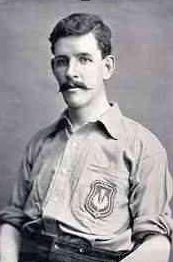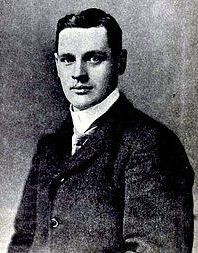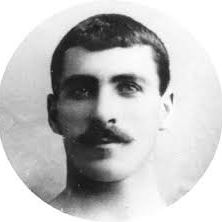The Association Footballers' Union
- a Scot-ish, football first
That modern football players are well-paid, some very, very well paid is a given but only a fairly recent one. Here, and somewhat glibly, indeed lazily, I could invoke the Bosman Ruling as the point post-1995 at which the modern reality began but the truth is that Bosman was not really about footballers' pay but free-movement between clubs and even then only within the EU and only at end of contract. It would not, even if in force at the time, have, for example, affected the impasse that, for example, Alex Jackson found himself in 1932-3 at Chelsea. He and the club had fallen out. Several reason's are given but the bottom-line was probably that, as captain, he was the spokesperson and therefore face for any player grievances and a number of the several Scots in the squad, including himself, were unhappy about their incomes that were being limited by the club's wage-cap. In fact the problem went deeper because most of those Scots were internationals and, at the instigation of Arsenal in 1930 there had been an attempt if not to remove then severely to control the availability for International games of players contracted by English clubs but from outwith, so Scots, Irish and Welsh. It had meant that in the case of Scotland between June 1930 and September 1932 only one Anglo, Sunderland's Jimmy Connor, played for the national team with loss of revenue, not to say pride, to the established stars, Jackson amongst them.
The matter was not resolved until October 1932 and its resolution largely due to the efforts, the balm, of the SFA President, Robert Campbell of St. Johnstone, one of the great and most unsung heroes of Scottish, indeed, international football. Here was a man who, elected in 1927 and remaining in post until 1934, was not only chairman of the selectors of the 1928 Wembley Wizards team but probably saved the globally the International from club-domination and therefore elimination. What might have been installed in Britain in 1931 would more than likely have become the model world-wide had it not been quietly charmed to death by Campbell at source.
However, back to Alex Jackson. As perhaps in his era the best footballer in Britain and therefore worldwide and still only twenty-six Jackson might have played for Scotland for half a decade more with the consequent kudos and, importantly, income. Instead he found himself mid-contract, frozen out at Stamford Bridge so on minimum money with nowhere to go except outwith the Football League and indeed the other main British Leagues, where his Chelsea contact was still enforceable. So, left with no choice, outwith is just where Jackson went, at first in England in lower leagues for pay-per-game payments at Ashton and then Margate and then to France, where his English contract had no validity. And the point of all this is twofold, first that, even though there was a players' union, the Professional Footballers' Association, found in 1907 in Manchester and still there, it could do nothing for him and, second, this was not the first time the wage-cap and restrictive contracts had reared their ugly, restrictive heads. For that and we have to step back thirty years further still and in doing so also uncover the real beginnings of footballing unionism, of, if you like, the first Bosmans.
I think it is a known known that modern players-salaries are result of broadcasting money. In fact until the arrival essentially of television the previous income-model for football, indeed all professionalised games, struggled. It was knife-edge between money out and paying-punters through the turnstiles, had been so since the inception of business-run sport and for which ground expansion was only a short-term panacea. In 1888 it had been raison d'etre for the proposal of and foundation by William McGregor of the Football League. For his Aston Villa and other clubs the previous model of Cup and friendlies was failing. The Cup worked. The friendlies didn't; too little public interest, too many cancellations. Regular, enforceable games were required. The League was seen as the solution and for a while it was, hence it has become the initial model for most sports.
But even the Football League found that after a honeymoon period income less expenditure, or at least return-on-investment was not what had been envisaged and just a half a decade after inception in 1893 at the initiation of Derby County the "executive" response was already cut costs, the wage-cap being specifically the iteration when it came to the footballers themselves. Until then the players' market had been more or less a free-for-all with raw material , the footballer, initially engaged on a more or less game-by-game basis. Longer-term, informal contracts then evolved as then did long-term, more formal ones, with the players themselves negotiating their best deals. At the very top of the scale they could be earning £10 a week. The Derby proposal was for a maximum of £4, in addition to which was the equally egregious one for a "retain-and-transfer" system to restrict the movement of players between clubs, i.e. the introduction of the rule that eventually did for Alex Jackson.
Now, with your knowledge of the cost-of-living in 1897-98 you might consider £10 a week a lot of money but remember that the English Football League was the first but by then not the only professional league. The SFA had "approved" professionalism in Scotland in 1893, although it had existed for several years before that. Moreover, the football played by Scots within and outwith Scotland had proved so superior to that South of the Border over the best part of a quarter of a century that the demand for Scottish players had been and was not limited to the Scottish clubs. In 1896 Sunderland had twenty-five Scots on its books, Liverpool eighteen, Everton sixteen, Burnley fourteen and even Derby twelve. That same year in English football there were at least two hundred and fifty Scots players, each of had had to be enticed South away from the Scottish game, many with families, and had to be remunerated accordingly. It is hardly then surprising that the prospect of a potential cut of 50% in income was not looked upon with unalloyed joy by the foreign itinerants or that there was a reaction.
Thus in February 1898 a number of prominent players, and others, the magic number of two hundred and fifty in all, got together to form the Association Footballers' Union (AFU), which from the beginning went far beyond just wages. A key policy was that players should have an involvement in any negotiations regarding their possible transfer (rather than being excluded from talks between the clubs concerned)[Alex Jackson eat your heart out]. Furthermore, simultaneously a parallel organisation of the same name had been set up in Scotland and in March 1898 the two amalgamated to form the National Association Football Players' Union (NAFPU). It too sought reform of contracts but also set up a provident fund for members, who fell on hard times. A union fundraising match between English and Scottish players was even staged that April, approved by both the FA and SFA but notably held in Scotland at Ibrox.
The founders and leading lights of the Scottish AFU were, of course, Scots. From Scotland's leading sports historian, the inestimable Andy Mitchell, we know that its slogan was "Defence not Defiance", Scottish indeed international watch-words for all time, and its management committee consisted of the Dan Doyle of Celtic, William Baird of St. Bernard's, James Gillespie of Third Lanark, Jimmy Raeside then of Clyde and Jimmy Millar of Rangers, all current or future Scottish internationals. But what is not recognised is that much of the executive of the English version was also Scots.
Indeed the Chairman of both the English AFU and NAFPU was John (Jack) Bell, (left) the Dumbarton-born, Scottish international and then an Everton player. In fact the epi-centre of the English AFU was to be the city of Liverpool. Amongst its prime-movers were in addition to Bell to be Ayr-born John Cameron, the AFU's first Secretary, and Arbroath's David Storrier, both also of Everton, plus from the same club the multiple England international, Johnny Holt, to whom could be added Liverpool's Abe Hartley, who grew up literally down Dumbarton High St. from the Bells, England international, Tom (Harry) Bradshaw, from the same club.
And to them could be added Edinburgh's Jimmy Ross, previously Liverpool, then Burnley, Preston and England's Bob Holmes, Jack Devey of Aston Villa and England, also Ayr-born Johnny Somerville of Bolton, Harry Wood of Wolves and England, James McNaught, then of Newton Heath, the future Manchester Utd. and another Dumbarton-boy, plus Willie Stewart, another Arbroath laddie, Peter Meehan from Broxburn and Scotland, Jacky Robertson, Dumbarton yet again and all Everton once more, plus the great Welsh forward, Billy Meredith of Manchester City.
In fact the AFU and the NAFPU were never recognised by the FA and the major English clubs involved reacted badly, Everton especially. By the 1889-90 season Bell and Storrier were both out-the-door at Celtic, outwith the wage-cap, Cameron (left) was at Spurs, joined there by Bradshaw, and McNaught, with Holt at Reading, both in the Southern League and again outwith. As to Hartley, he was at Southampton, again in the Southern League and with Robertson, Wood and Meehan. And Stewart had gone to Bristol City once more outwith.
As can be seen it was the Scots, already itinerant, who mostly were on the move and with significant repercussions. Whilst Everton in fact held its own in the League Tottenham under Cameron as player/trainer went on to win the 1901 FA Cup Final, the only team after 1888 outwith the League ever to do so, whilst the other Southern-Leaguers also grew in strength, notably Southampton. It had already reached the 1900 FA Cup Final, thus potentially pipping Spurs, and would do so again in 1902, only to lose both.
Meanwhile matters had moved on. In 1900 the FA "placed a maximum wage on its statues", only to remove it once more in 1904. In 1901 the Football League introduced a maximum wage of £4 into its regulations and at the same time abolished all bonuses. In the interim the AFU had lingered on only to be dissolved that same year. It seemed the clubs' destructive objectives had been fully achieved and in part might also explain the noticeably falling numbers of Scots then coming south. From a peak of 270 in 1899 it was now 230 and by 1907 would be just over 200, reduced certainly by better money in a booming game at home but also perhaps a decrease in financial incentives in England.
But there was clearly more pressure building from boiler-room. In December 1907 at the behest of Charlie Roberts of Manchester United and with once more a far-from-happy or -cowed Billy Meredith (left) as the torch-bearer a meeting was called, this time in Manchester, from which emerged the Association Football Players' and Trainers' Union. Its aims were much the same as a decade before. Jack Bell, now a Preston player, was even present.
And whilst this second, English attempt at a union suffered from much the same intimidation as the earlier one somehow it survived despite in 1909 the English FA withdrawing recognition, in 1909-10 a players' strike resulting in the banning sine die by the FA of all those associated with the union and the loss in 1912 of a three-year long, contractual test-case against Aston Villa, which resulted in a loss of membership and almost financial ruin. However, it did succeed in the reinstatement of the possibility of bonuses and, under its later iteration, the Professional Footballers' Association, in a change of contracts, albeit some fifty years later.
And that is the essence of the tale. Player representation, including unionisation, was and has been a case till post-Bosman of nothing ventured short-term, nothing gained long. Now it is, if anything, a case of the clubs being at the behest of the best players and not vice versa; something for which they are or at least should be extremely grateful. However, the players in general and certainly the World's best-paid, if not necessarily the best, might morally go one further. They should openly show thanks to a small number of their predecessors, at the core no more than one dozen and a half, who a century and quarter ago were prepared to put their heads above that first parapet. And since ten of the "militants" aka pioneers were Scots, four alone Sons of the Rock, those same modern players and certainly Scotland in general should go further still in honouring men, who showed they fitted into not just their own but Keir Hardie's boots. At the very least a funded plaque, I suggest in Dumbarton, might not go amiss.
Back to the SFHG Home page


